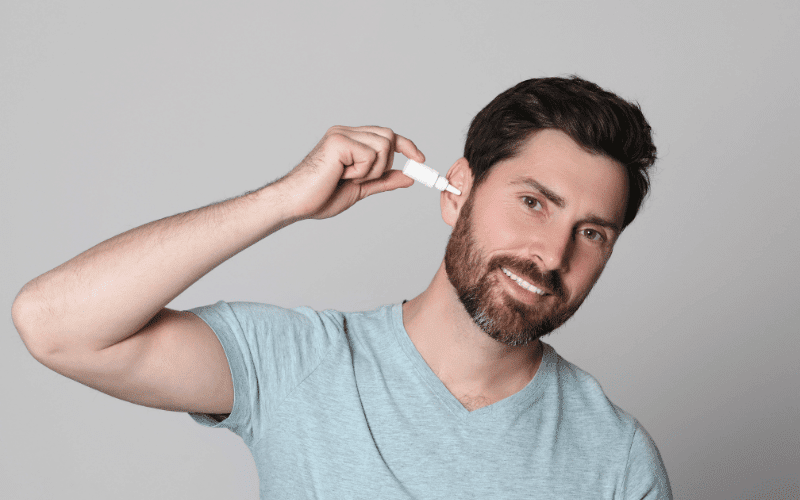Earwax buildup is a common issue and affects many of us, but regularly cleaning the outer ear canal typically helps in preventing complications. However, individuals who produce darker and thicker earwax are more susceptible to ear problems if they don’t manage it properly. Practices like using cotton swabs or bobby pins can increase the risk of trauma, ear infections, and hearing loss.
Occasionally, earwax blockage may lead to dizziness or vertigo, resulting in a period of discomfort until the buildup is resolved. While earwax blockage is often treatable at home, medical attention may be required if it leads to vertigo.
Here’s what you need to know about that dizzy sensation and your earwax:
What Is Earwax?
Earwax, or cerumen, is a waxy substance produced by glands in the ear canal (sebaceous and ceruminous glands). Usually, earwax doesn’t pose a problem, and serves to protect the skin inside the ear canal. Healthy ears produce earwax constantly and this is a sign of good health.
"Treble Health helped me turn down the sound of my tinnitus. Now I can breathe, and get on with my life!"


"Treble Health helped me turn down the sound of my tinnitus. Now I can breathe, and get on with my life!"
– Elisa
Schedule a free consultation to learn which Treble Health solution is right for you. Join Elisa and thousands more who have found lasting tinnitus relief.
Book a free consultation to learn which Treble Health solution is right for you. Join Elisa and thousands more who have found lasting tinnitus relief.
Earwax is produced deeper within the ear canal and eventually makes its way out of the ear. It pushes dirt/dust, and even foreign objects out of the ear canal to prevent ear infections. It also works as a skin lubricant and helps to prevent dry skin in the ear canals.
Types Of Earwax
Normal earwax will vary in color, usually appearing light amber to dark brown. Black or green earwax could signify an ear infection or impacted earwax and may require a medical assessment. Blood red earwax could indicate the presence of an injury to the ear canal, which can indicate the need for a medical evaluation.
Earwax can also be wet or dry, both of which are completely normal. This is largely genetic and people with wet earwax are usually of European or African descent, while dry earwax is dominant in people of East Asian and Native American descent.
Should Earwax Be Removed?



The ears are amazing self-cleaning organs, and earwax eventually falls out as new wax is produced to keep the ears healthy and functioning properly. Typically, earwax poses no health risk, and unless there’s a problem like hearing loss or ear pain, the American Academy of Otolaryngology Head and Neck Surgery Foundation recommends leaving earwax alone.
In severe cases where some individuals have narrow ear canals or excessive amounts of earwax are produced, seeing a professional is recommended.
Symptoms Of Earwax Blockage
An earwax blockage is pretty obvious, and can be accompanied by mild symptoms like discomfort, to more severe symptoms like vertigo. Here are some common symptoms of impacted earwax:
- Ear pain
- Tinnitus
- Ear fullness
- Itchiness
- Foul odor from the ear
- Decreased hearing/possible conductive hearing loss (hearing loss caused by obstruction of sound)
- Dizziness/vertigo
What Is Vertigo Or Dizziness?
Dizziness affects millions of Americans and is often described as feeling faint, woozy, weak, or unsteady. There can be many different causes of dizziness, such as motion sickness, side effects from medication, or hunger/low blood sugar.
Vertigo happens when this dizziness creates a false sensation that the surroundings are spinning or moving. It most commonly occurs when there is an issue with the inner ear such as BPPV, Meniere’s disease, presence of a tumor, or infections.
Other common causes of dizziness and vertigo:
- Stroke
- Head injury/trauma
- Hypotension, or low blood pressure
- Anxiety
- Neurological disorders, such as multiple sclerosis or Parkinson’s disease
- Impacted earwax
Get a medical assessment right away if you experience dizziness or feel off balance due to blocked ears. Treatments may vary for earwax blockage, and healthcare providers may recommend medication, repositioning maneuvers, or even surgery.
What Are The Symptoms Of Vertigo?
People experiencing vertigo often complain of:
- Nausea and vomiting
- Aural fullness
- Balance issues
- Tinnitus (ringing in your ears)
- Headaches
- Nystagmus (unusual eye movements)



These symptoms can range in severity, intensifying whenever a patient is walking, standing up suddenly, or during head movements.
How Long Does Vertigo Last?
Vertigo can last for as little as a few seconds, or go on for days – the duration varies based on the patient and the underlying cause of the vertigo. Peripheral vertigo comes from a problem in the inner ear which affects the vestibular system. Central vertigo, on the other hand, indicates a more serious and potentially dangerous issue due to infection, stroke, or recent head trauma.
Vertigo is different for everyone, and the cause of the vertigo can determine how long your symptoms will last. Vertigo due to earwax blockage is usually easy to treat, and symptoms will only last for a few seconds to a few minutes. This will persist until you have the earwax removed.
Benign paroxysmal positional vertigo (BPPV) occurs when small calcium crystals found in the inner ear called otoconia throw off balance. This is a fairly common condition and symptoms usually only last for a minute or less, but tend to reoccur.
Vestibular neuritis, or inner ear infection, can also cause vertigo that lasts until the inflammation subsides. Permanent or semi-permanent vertigo can result from migraines, stroke, head injury, or as a result of Meniere’s disease. These episodes of vertigo can last up to several hours.
Can Earwax Cause Vertigo?
Yes, earwax blockages have been known to result in Vertigo. The inner ear houses the vestibular system, the part of our body that’s responsible for maintaining balance. Impacted cerumen or earwax buildup in the ears can cause dizziness and vertigo when it accumulates on the eardrum.
Certain groups of people are more at risk of excess earwax causing symptoms of vertigo. For instance, elderly people who wear hearing aids are more susceptible to falls due to impacted earwax. Swimmers and surfers sometimes experience blocked ears as a result of water causing earwax to expand and block the ears.
How Does Impacted Earwax Cause Vertigo?



The short answer is that the impacted cerumen or wax build up makes it harder for earwax to naturally exit the ear canal, which affects the normal functioning of the balance organs in the inner ear.
A more detailed explanation involves the impacted earwax eventually creating too much pressure on the eardrum or tympanic membrane. Our auditory system relies on our eardrums to send signals to the middle and inner ear before it’s amplified and sent for processing in the brain. Excessive earwax will make the brain misinterpret these signals, leading to dizziness or vertigo.
An earwax blockage can also cause the skin in the ear canal to become inflamed and affect important balance organs in the same way. Researchers at the Journal of Laryngology and Otology have proven that patients with vertigo are more likely to have impacted wax than those without. Another published in the European Archives of Oto-Rhino-Laryngology concluded the same.
Can Earwax Removal Help With Vertigo?
Vertigo can sometimes be treated by removing excess wax build up in the ears, but only if that is the underlying cause. Both studies mentioned above revealed earwax removal was key to relieving the symptoms of vertigo, however, if symptoms persist it may be a sign of something else. Vertigo is a symptom of many underlying conditions.
How To Get Rid Of Impacted Earwax At Home



The good news is that most cases of impacted earwax can be treated at home. The best way to treat earwax impaction at home is with over-the-counter ear drops or wax softeners. These must contain hydrogen peroxide, glycerin, or mineral oil to soften and loosen hard wax in the ears.
Flushing the ear canal with a saline solution using a bulb syringe or irrigation kit is another common at-home treatment option. This should follow an ear examination to determine if ear irrigation is a suitable treatment. Wax softeners or drops may be combined with ear syringing for more effective earwax removal.
Never use stick cotton swabs to remove earwax. Bobby/hair pins, ear candles, and vacuum kits may cause ear canal trauma or burns. Ear pain, fever, or drainage are signs to see a professional right away.
When To Seek Medical Assistance
Seek medical assistance if home remedies were not able to remove impacted wax, or if you experience severe pain. Your primary care professional should be able to help remove earwax, however, you may be recommended to an audiologist, or otolaryngologist (ENT).
Ear irrigation (ear syringing) is usually an effective earwax removal treatment, and can help treat symptoms of vertigo. However, ear syringing is not an appropriate wax removal option for patients with deafness in one ear, tympanic membrane perforation, recent ear surgery or infection, or tinnitus.
Manual removal in a clinical setting using a probing device and a suction device, or type of forcep, is usually the last resort for wax impaction. Note that this treatment requires a skilled medical professional and a cooperative patient to avoid ear trauma and possible infection.
If you deal with impacted earwax regularly, ask your healthcare provider for product recommendations.
Make An Appointment Today
Ditch the cotton swabs and preserve your ear health with help from the experts at Treble Health.
Next Step: Book Free Consultation
- 75% of patients reduced their tinnitus within three months after following our recommendations.
- "I feel like Treble Health literally gave me my life back." - Randy S. (verified customer)
- Join thousands of people who have reduced their tinnitus after scheduling a free consultation.




















